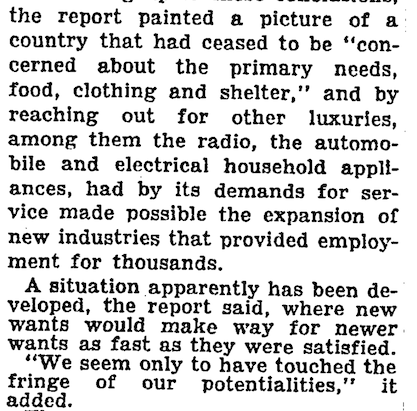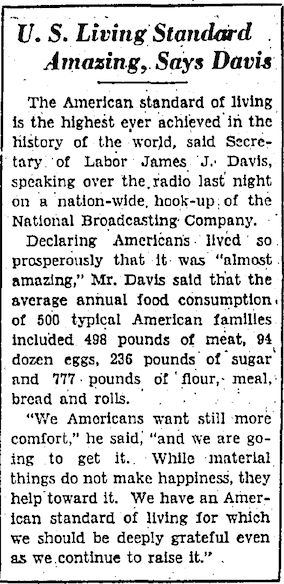History Is Only Interesting Because Nothing Is Inevitable
@tags:: #lit✍/📰️article/highlights
@links::
@ref:: History Is Only Interesting Because Nothing Is Inevitable
@author:: Morgan Housel
=this.file.name
Reference
=this.ref
Notes
One is that the four inventions that transformed the 1920s – electricity, cars, the airplane, and the radio, and – seemed indistinguishable from magic to most Americans. They were more transformational to the economy than anything since the steam engine, and changed the way the average American lived day to day than perhaps any other technology before or since. Technology that spreads so far, so fast, and deeply tends to create an era of optimism, and a belief that humans can solve any problem no matter how difficult it looks. When you go from a horse to an airplane in one generation, taming the business cycle doesn’t sound outrageous, does it?
- View Highlight
-
- [note::Is the age of AI different?]

- View Highlight
-
- [note::Wants of whom? White people, I presume.]

- View Highlight
-
In 1920 Americans were out of work and desperate for a paycheck. Nine years later, the top national goal was promoting leisure time.
- View Highlight
-
- [note::This seems like such an interesting case study of how relative societal prosperity biases collective perception.]

- View Highlight
-
- [note::Is this the root of America's conflation of financial success with happiness?]

- View Highlight
-
(highlight:: Over the next three years the Great Depression put 12 million Americans out of work.
The stock market fell 89%, reverting to levels last seen 36 years prior.
GDP fell 27%.
Prices fell 10% per year.
Nine thousand banks failed, erasing $150 billion in American checking and savings accounts.
Births declined 17%.
Divorce rose by a third.
Suicides rose by half.)
- View Highlight
-
(highlight:: There has never been a period in history where the majority of people didn’t look dumb in hindsight.
People are good at analyzing and predicting things they know and can see. But they cannot think about or prepare for events they can’t fathom. These out-of-the-blue events go on to be the most consequential events of history, so when we look back it’s hard to understand why few people cared or prepared. The phrase “hindsight is 20/20” doesn’t seem right, because 20/20 implies everything coming into a clear view. In reality, hindsight makes most people look dumber than they actually were.)
- View Highlight
-
(highlight:: When you look back at what people said in the late 1920s – their confidence, their clarity, their logic – you can’t help but wonder what we are confident in today that will look foolish in the future.
What those things might be, I don’t know.
It wasn’t obvious in the 1920s.
It won’t be obvious in the 2020s.
That’s what makes history interesting – nothing’s inevitable.)
- View Highlight
-
dg-publish: true
created: 2024-07-01
modified: 2024-07-01
title: History Is Only Interesting Because Nothing Is Inevitable
source: reader
@tags:: #lit✍/📰️article/highlights
@links::
@ref:: History Is Only Interesting Because Nothing Is Inevitable
@author:: Morgan Housel
=this.file.name
Reference
=this.ref
Notes
One is that the four inventions that transformed the 1920s – electricity, cars, the airplane, and the radio, and – seemed indistinguishable from magic to most Americans. They were more transformational to the economy than anything since the steam engine, and changed the way the average American lived day to day than perhaps any other technology before or since. Technology that spreads so far, so fast, and deeply tends to create an era of optimism, and a belief that humans can solve any problem no matter how difficult it looks. When you go from a horse to an airplane in one generation, taming the business cycle doesn’t sound outrageous, does it?
- View Highlight
-
- [note::Is the age of AI different?]

- View Highlight
-
- [note::Wants of whom? White people, I presume.]

- View Highlight
-
In 1920 Americans were out of work and desperate for a paycheck. Nine years later, the top national goal was promoting leisure time.
- View Highlight
-
- [note::This seems like such an interesting case study of how relative societal prosperity biases collective perception.]

- View Highlight
-
- [note::Is this the root of America's conflation of financial success with happiness?]

- View Highlight
-
(highlight:: Over the next three years the Great Depression put 12 million Americans out of work.
The stock market fell 89%, reverting to levels last seen 36 years prior.
GDP fell 27%.
Prices fell 10% per year.
Nine thousand banks failed, erasing $150 billion in American checking and savings accounts.
Births declined 17%.
Divorce rose by a third.
Suicides rose by half.)
- View Highlight
-
(highlight:: There has never been a period in history where the majority of people didn’t look dumb in hindsight.
People are good at analyzing and predicting things they know and can see. But they cannot think about or prepare for events they can’t fathom. These out-of-the-blue events go on to be the most consequential events of history, so when we look back it’s hard to understand why few people cared or prepared. The phrase “hindsight is 20/20” doesn’t seem right, because 20/20 implies everything coming into a clear view. In reality, hindsight makes most people look dumber than they actually were.)
- View Highlight
-
(highlight:: When you look back at what people said in the late 1920s – their confidence, their clarity, their logic – you can’t help but wonder what we are confident in today that will look foolish in the future.
What those things might be, I don’t know.
It wasn’t obvious in the 1920s.
It won’t be obvious in the 2020s.
That’s what makes history interesting – nothing’s inevitable.)
- View Highlight
-
